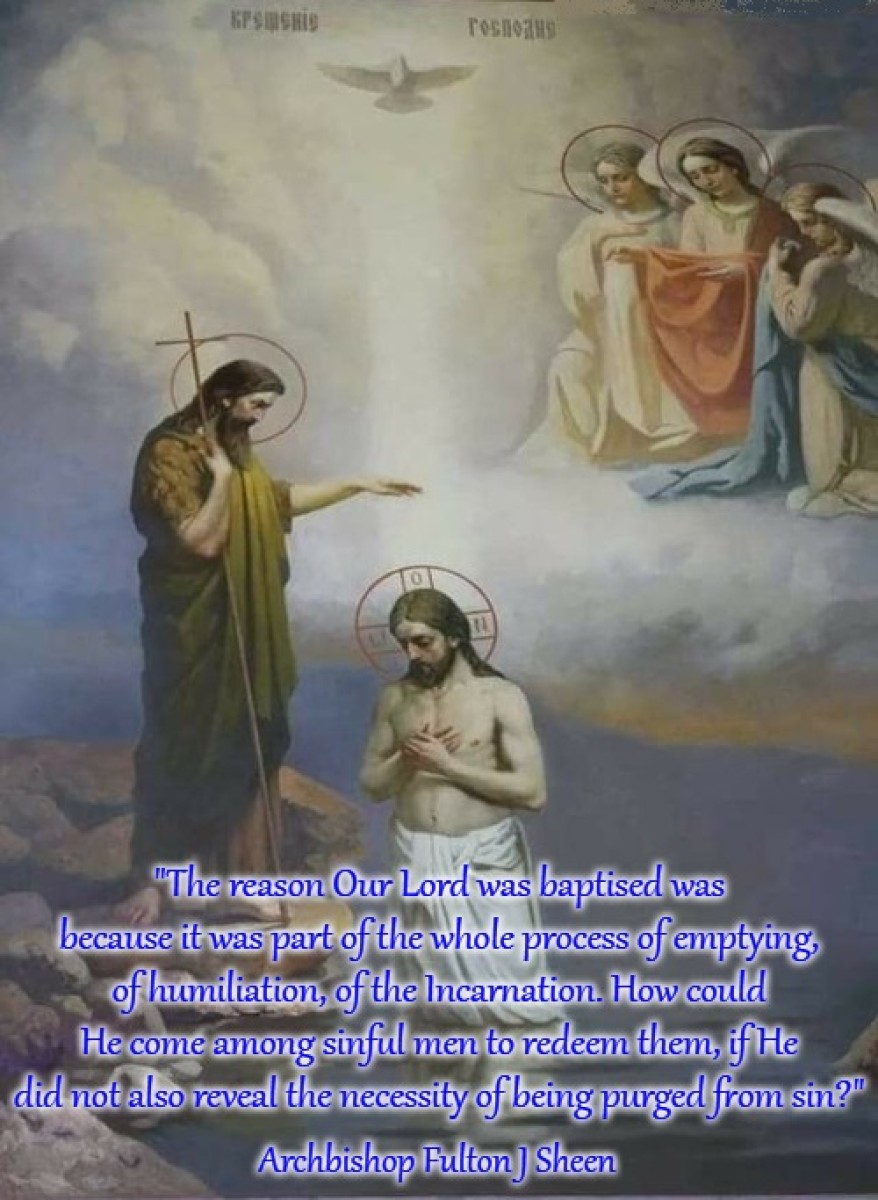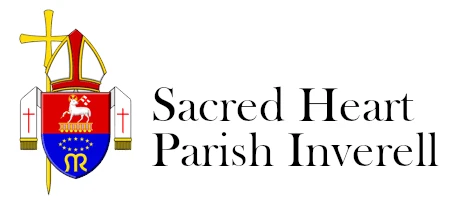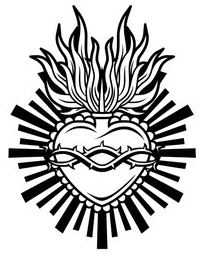The Baptism of the Lord (Year C) - 12 January 2025
12th January 2025

“The Lord was Baptised, not to be cleansed Himself, but to cleanse the waters, so that those waters, cleansed by the flesh of Christ which knew no sin, might have the power of Baptism.” - St Ambrose of Milan
A reflection on the theme of today's Gospel, being Baptism, by the Venerable Archbishop Fulton J Sheen:
"Under the Old Law people believed in, or yearned for, a Messiah who was to come. Abraham believed and his faith was accounted to him as justice, and he received circumcision as a sign of faith.
"What was the faith, therefore that justified Abraham, who was the father of the Jews? It was the faith in the Messiah, or the Christ Who was to come. There is no salutary faith except in Christ. The Jews believed in the Christ Who was to come; we believe in Christ Who has come. The times have changed, but the reality of faith has not changed. There is only one faith. The faith that saves all men, making them pass from carnal generation to spiritual birth.
"The reason Our Lord was baptised was because it was part of the whole process of emptying, of humiliation, of the Incarnation. How could He be poor with us, if He did not in some way conform to our poverty? How could He come among sinful men to redeem them, if He did not also reveal the necessity of being purged from sin? There was no need of Our Blessed Mother to submit to the rite of purification, as there was no need of Our Lord to submit to the rite of Baptism by John. He had no need personally of having sins remitted, but He assumed a nature which was related to sinful humanity. Though He was without sin, He appeared to all men as a sinner, as He did on the cross. That was why He walked into the Jordan with all the rest of the sinners to demand the baptism of penance ‘in remission of sins.’
"In a very special way, Baptism is related to the Death and Resurrection of Christ. In order to be saved, we have to recapitulate in our own lives the Death and the Resurrection of Christ. What He went through, we have to go through. He is the pattern, and we have to be modelled after Him. He is the die, we are the coins that have to be stamped with His image. In all of the sacraments, the virtue of the Passion and Resurrection of Christ is in some way applied to us. In Baptism, there is a very close relationship between the burial and the resurrection. The catechumen is plunged into the water as Christ was plunged into death. We say plunged into death because of the words of Our Lord: ‘There is a baptism I must needs be baptised with, and how impatient am I for its accomplishment’ (Luke 12:50). Baptism not only incorporates us to the death of that which is evil in us, but also to the Resurrection of Christ, and therefore, to a new life.
"There was recently found an inscription on a baptistry erected in the time of Constantine in the beginning of the fourth century, and it reads: ‘The waters received an old man, but brought forth a new man.’ St Paul speaks of this: ‘It follows, in fact, that when a man becomes a new creature in Christ, his old life has disappeared, everything has become new about him’ (2 Corinthians 5:17)."
(These are the Sacraments)
Prayer for the Baptism of the Lord
Eternal Father, Who at the baptism of Jesus revealed Him to be Your Son, anointing Him with the Holy Spirit: grant that we may be faithful to our call as Children of God, listening to You, guided by Your Spirit, to fulfil our unique and definite purpose. Bestow upon us all the graces we need to attain that level of perfection which will make us pleasing in Your sight. Grant us the strength to be faithful followers of Christ Jesus Your beloved Son, Who lives and reigns with You and the Holy Spirit, One God for ever and ever. Amen. 💐💖🙏
What does the Church teach us about Baptism?
The Church teaches that Baptism is a fundamental sacrament in the Christian faith, serving as the gateway to spiritual life and the initiation into the Church. It is recognised as the sacrament of regeneration, which cleanses individuals from original sin and incorporates them into the body of Christ, making them children of God and heirs of heaven.
Baptism is described as the basis of the whole Christian life and is essential for salvation.
This sacrament is not merely a ritual; it signifies a profound transformation and a new beginning in the life of the believer.
The Catechism of the Catholic Church emphasises that Baptism is the door that gives access to the other sacraments, establishing a vital connection to the life of grace within the Church.
The rite of Baptism involves the use of water, which symbolises cleansing and rebirth. The invocation of the Holy Trinity during the baptismal ceremony signifies the consecration of the baptised to God and their entry into communion with the Father, Son, and Holy Spirit.
The Church holds that once Baptism is validly celebrated, it cannot be repeated and that it should be conferred as soon after birth as possible, ideally within the first few weeks. This practice is rooted in the understanding of Baptism as a necessary sacrament for salvation, the gateway to heaven, which provides the grace needed to cleanse original sin and initiate the child into the holy Church of God.


